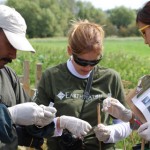 Citizen science has undoubtedly been one of the most exciting aspects of social business over the past few years. A whole host of projects have emerged to allow passionate people to participate in a range of ways, whether it’s playing games, donating spare computer power or actively participating in the science itself.
Citizen science has undoubtedly been one of the most exciting aspects of social business over the past few years. A whole host of projects have emerged to allow passionate people to participate in a range of ways, whether it’s playing games, donating spare computer power or actively participating in the science itself.
Such projects obviously have many benefits, but how do they compare against the professional science that has traditionally dominated such work?
That was the question posed by researchers at FreshWater Watch, a project that aims to test ponds, streams and small lakes for water quality. They’ve recruited over 3,000 citizen scientists across 32 urban areas in the last 18 months, and Earthwatch, the organization behind the project, are now looking to test the quality of those contributions.
“The global nature of FreshWater Watch is not only providing some fantastic new insights into water quality on a scale never seen before, but it is also a brilliant opportunity to evaluate the motivations behind why people get involved in projects such as these and the part that geographic location and culture has to play,” says Dr Charlotte Hall from Earthwatch.
FreshWater Watch was designed in such a way as to try and cater for the citizen scientist at each stage of their lifecycle, from their initial desire to learn more through to active collaboration and finally continued involvement.
The project has used features such as discussion forums, leaderboards and various gamification features to try and maintain enthusiasm.
Thus far the citizen scientists have uploaded around 5,000 data sets via both the website and the smartphone app. Collectively, these findings are providing a database of freshwater quality that will be shared with official organizations.
Initial findings from the project have been presented at the joint meeting of the British Ecological Society and the Société Française d’Ecologie recently.
The growth of collaborative science
Of course, this isn’t the first such attempt to better understand the citizen science landscape. Earlier this summer the Collaborative Science website launched to try and help organizations get cracking with citizen science.
The site was created by a consortium of five universities with the aim of training naturalists in ecology, scientific modeling and adaptive management. They would then be given a space on the site to give students the chance to put their training into action.
Modeling is at the heart of the site, with various tools offered to help volunteers understand and analyze the data they collect through their research more effectively. They are then guided through the creation of a management plan to help them with their conservation work.
The value of citizen science
If we should be in any doubt over the benefits of citizen science, a study published earlier this year by researchers at the University of Boulder should squash them.
The focus of their study was the CosmoQuest website, whereby members of the public join with professionals to try and spot craters on the moon from amongst photos taken by NASA’s Lunar Reconnaissance Orbiter.
It turned out that they were just as effective at spotting lunar craters as experts in the field with up to 50 years experience. So pretty well all in all, and certainly well enough to please the researchers.
“What we can say is that a very large group of volunteers was able to chart these features on the moon just as well as professional researchers,” said Research Scientist Stuart Robbins of CU-Boulder’s Laboratory for Atmospheric and Space Physics, who led the study.
The future of citizen science
The following is a fascinating talk by Dr Chris Lintott and Dr Brooke Simmons talk about the future of citizen science, delivered to Oxford University’s Oxford Martin School. The talk focuses on the Zooniverse platform due to the experience Dr Lintott has had running and growing the platform.
Fascinating isn't it? You'd never imagine a bunch of randoms could do the job of trained professionals.